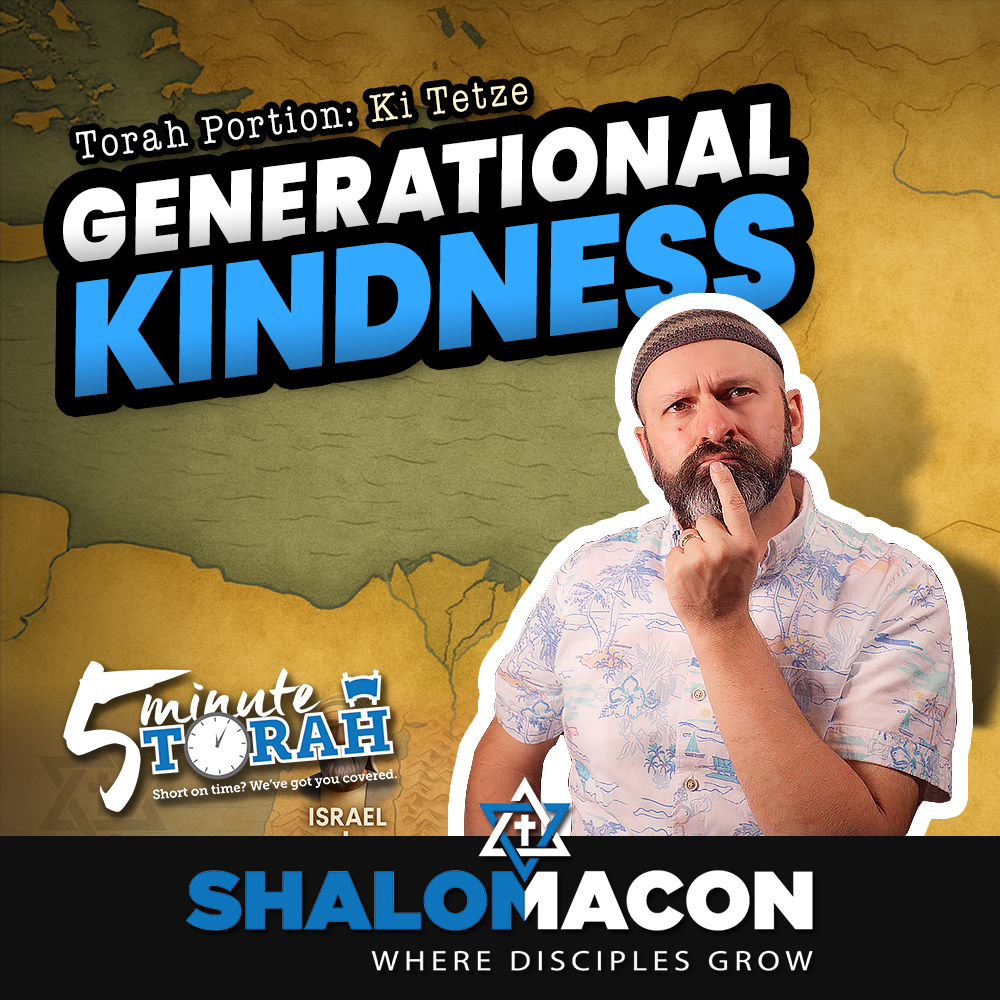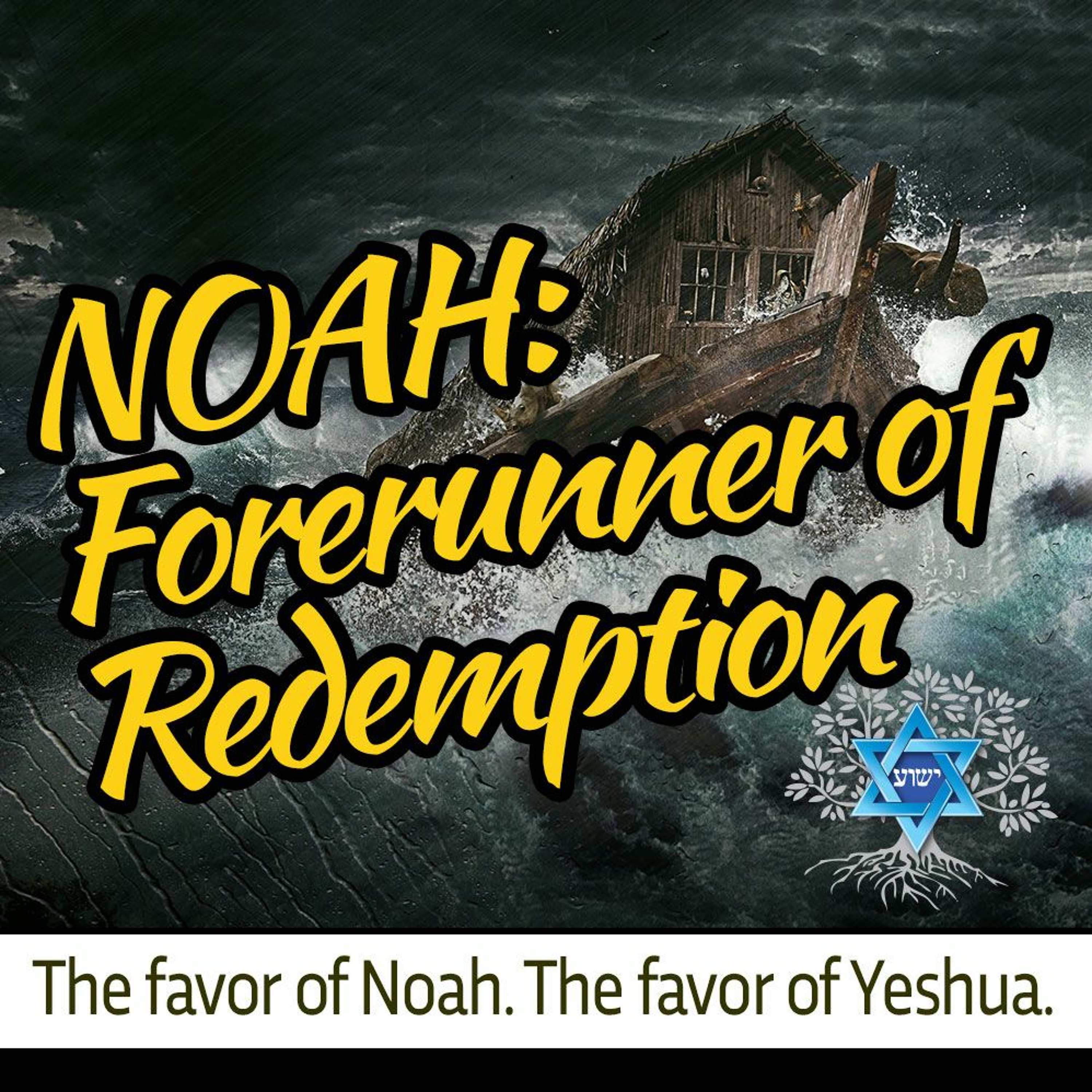Episode Transcript
[00:00:00] What if God remembers kindness long after we've forgotten it? In our culture, gratitude often lasts about as long as a thank you card, but in the Torah, God remembers acts of kindness for generations. This week's Torah portion shows us how God blessed some nations and rejected others not only because of their sins, but because of how they treated his people centuries earlier. Join me as we uncover the power of generational kindness in this week's five Minute Torah Shalom and blessings from Shalom Macon, the place where disciples of Yeshua learn, connect and grow. I'm Darren, and before I get into the five minutes of my five Minute Torah commentary, let's cover a few quick facts about this week's Torah portion. This week we are studying the 49th portion of the Torah cycle and the sixth portion of the Book of Deuteronomy. We are in the portion of Kitaitze Deuteronomy 21:10 through 25:19 and and here are the three things that you need to know about it. Number one Torah ethics how to Love Our Neighbor Kitaitze is packed with practical laws that show us what it really means to love our neighbor. These instructions call Israel to treat others with kindness, fairness, and compassion, and they even extend to the humane treatment of animals. We find commandments about paying workers on time, being honest in business, returning lost property, caring for the poor and the stranger, and even helping an animal struggling under its load. There's also the puzzling Mitzvah of Send mother bird before taking her eggs or chicks, reminding us that God's concern reaches every corner of creation. Number two Kilim and shatnas Forbidden mixtures Kitetse also teaches us about forbidden mixtures, sowing two kinds of seed together, plowing with an ox and a donkey, or wearing garments made of both wool and linen. The general term for these prohibitions is kilim, while garments made of wool and linen are called shatnas. But there's one striking exception. The high priest garments were woven from linen threads interlaced with blue, purple and scarlet wool. Why is it permitted for him, but not for everyone else? Perhaps it's a reminder that there's only one Cohen gadol set apart in holiness, and Israel must never confuse his unique calling with their own. Number three Family dynamics God at the center Kiteti also addresses laws concerning marriage, divorce, and family life. It sets guidelines for how wives are to be treated, how divorce is to be handled, and how the rights of the firstborn sons are to be protected. While some of these instructions may feel foreign to us today, the heart of the Torah's message is clear. Family is sacred, relationships matter, and God must remain at the center of it all.
[00:02:47] What does it really mean to live by the Spirit of the Law and not the letter of the Law? For centuries, believers have been told that the Law of God is a burden and something Yeshua came to set us free from. But what if that's not what the scriptures say at all? What if Paul's words about the letter of the law killing were never meant to pit God's spirit against his own commandments? In my new book, Spirit of the Law, I take a closer look at the writings of Paul, the teachings of Yeshua, and the Torah itself to uncover a consistent truth. The problem was never God's Law. It was the human heart. And rather than repealing his father's commandments, Yeshua came to transform our rebellious heart, empowering his disciples to walk in the fullness of the Spirit of the Law. But in order to accomplish this, we first need to understand what it means. If you've ever struggled to reconcile law and grace, Spirit of the Law will open your eyes to a richer, more faithful understanding of both. It will challenge assumptions, bring clarity to misunderstood passages, and invite you into a deeper walk of obedience, one that's alive with the Spirit of God. Pick up your copy today and let the Spirit of the Law transform the way you see God's Word and the way you live it. It may just be the missing key you've been looking for to unlock the Scriptures and open a whole new world of biblical understanding. Once it clicks, you'll want to invite others to join the journey as well. This week's Torah commentary is called Generational Kindness and comes from my book, Five Minute Torah, Volume 3. Although our current Torah portion covers a broad range of subjects, there is a curious set of instruction that begs to be explored. In this passage, in Deuteronomy 23:4:9, the Lord commands Israel to perpetually forbid the Ammonites and the Moabites from joining themselves to Israel. He even goes so far as to say, you shall not seek their peace or their prosperity all your days forever. However, he tells them, they shall not abhor either the Edomites or the Egyptians. At first, this doesn't seem to make sense. Why does God tell the children of Israel not to hate the Edomites and the Egyptians, but establishes a permanent admonition against allowing the Ammonites and Moabites into their ranks? Let's dig into this and see what we can understand. First, our Torah portion gives reasons they are to shun The Ammonites and moabites in Deuteronomy 23, verse 5 regarding the Ammonites, it says, because they did not meet you with bread and with water on the way when you came out of Egypt. Egypt? How so? The Ammonites refused hospitality to Israel when they left Egypt, even though Israel asked them permission to peacefully pass through their land. See Deuteronomy 2 regarding the Moabites, it says, because they hired against you Balaam the son of Beor from Pettor of Mesopotamia, to curse you. The Moabites schemed against Israel by hiring Balaam, a Midianite, to curse them. Balaam eventually gave up, however, and devised a plan that successfully lured Israel into sexual immorality and idolatry, resulting in a plague that killed 24,000 Israelites. See Numbers 25.
[00:05:44] Next, while the sin of Moab seems obvious and deserving of the Lord's anger, it doesn't appear that the Ammonites are as deserving of his wrath, especially when the Edomites committed the same offense Back in numbers, chapter 20. How do we resolve this seemingly random choice of favoritism, and what can we learn from it? There are a few factors to take into consideration. As we know, the Ammonites, the Moabites, and Edomites are all distant relatives of Israel. The Ammonites and the Moabites are descendants of Abraham's nephew Lot, whereas the Edomites are the descendants of Esau. The Egyptians, however, are an entirely different matter. What is the common thread that pulls this all together? For one God promised to bless the offspring of Abraham, but not the offspring of Lot. Also, Rabbeinu Bachia points out that the Ammonites and Moabites, being descendants of Lot, could not have survived without Israel, since Lot owed his very life to Abraham see Genesis 14 and 19. Therefore, the Ammonites and Moabites should have remembered the kindness of Abraham and treated his offspring with kindness as well. But what about Egypt? Egypt doesn't have any biological relationship with Abraham. However, Egypt bestowed a great kindness on Abraham's children when their lives were in danger, and they welcomed them into Egypt during the great famine and treated them with respect, at least for a season. Therefore, the Lord remembered their kindness and promised to bless them as well. The Lord will make himself known to the Egyptians, and the Egyptians will know the Lord in that day and worship with sacrifice and offering, and they will make vows to the Lord and perform them in that day. Israel will be the third with Egypt and Assyria a blessing in the midst of the earth whom the Lord of hosts has blessed, saying, blessed be Egypt, my people, and Assyria, the work of my hands and Israel my inheritance. This is Isaiah, chapter 19, verses 21 and then 24. 25. In our Western civilization, we tend to think from a very egocentric and limited perspective. We're inclined to only be concerned about what has happened to ourselves rather than what has happened to our ancestors. The culture of the east, however, has a consciousness that extends over multiple generations. This is the perspective of the God of Israel as well. Therefore, we would do well to imitate his trait of remembering and repaying any debt of gratitude incurred by our family. Just as the Lord remembers how people treat his children and blesses them accordingly, even generations later, we should be mindful to those who bless us and our family and and return their kindness as well. We should be passing on a culture of gratitude to our descendants. Here's a challenge. What acts of kindness have been done for your parents and grandparents by others? And how can you return that kindness? What acts of kindness have been shown to you by others that your children need to know about? The Hebrew month of Elul is more than just another month. It's a divine invitation. The sages call it the time when the king is in the field. What does that mean for you and for me? Today I've got a full video that dives into it. You don't want to miss it. Just click on the link right here to check it out.



